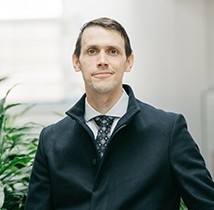Liam McHugh-Russell
Assistant Professor of Law
Email: liam.mchugh-russell@dal.ca
Phone: 902-494-4231
Mailing Address:
PO Box 15000 Halifax, Nova Scotia B3H 4R2
- Labour Law
- Law and Political Economy
- Business Associations
- Corporate Governance
- Law and Development
- Transnational Law and Governance
Education
- BMath (Waterloo)
- JD (University of Toronto)
- LLM (McGill)
- PhD (European University Institute)
Bar admissions
- Ontario, 2009
Bio
Liam McHugh-Russell is an assistant professor at the Schulich School of Law. He holds a PhD in law from the European University Institute in Florence Italy, where he was the holder of the Hans Kelsen doctoral scholarship and a doctoral award from the Social Sciences and Humanities Research Council. He received a Master of Laws from the Institute for Comparative Law, McGill University in 2013 and his Juris Doctor from the University of Toronto in 2008. He has been a lawyer member of the bar of Ontario since 2009. His professional experience includes many years working part-time at the International Labour Organisation in Geneva, Switzerland, and practice with a union-side labour law firm. He is also an associate member of the Labour Law and Development Research Laboratory (McGill University Faculty of Law), the International Economic Law Collective, and the Labour Law Research Network.
Areas of supervision: Professor McHugh-Russell would be glad to supervise graduate research projects in legal theory (especially socio-legal theory), law and economic development, labour and employment law (including international labour law), and corporate governance.
Research interests
Professor McHugh-Russell applies archival, analytical and critical methods to study legal contexts concerned with labour, corporate governance, and economic development to produce scholarship at the intersection of law, political economy, and the sociology of knowledge. He seeks to understand how law is shaped by other forms of expertise, how law interacts with other modes of governance, and how law and other forms of knowledge work together to distribute economic and political power. His research has included projects focused on debates about informal work at the International Labour Organisation, the impact of World Bank’s Doing Business project on national business regulations, and the rise of “corporate governance” as a globally dominant framework for thinking about corporate misconduct.


